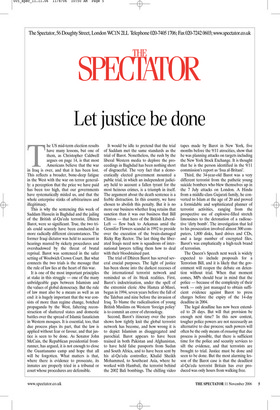Let justice be done
The US mid-term election results have many lessons, but one of them, as Christopher Caldwell argues on page 14, is that most Americans believe that the war in Iraq is over, and that it has been lost. This reflects a broader, bone-deep fatigue in the West with the war on terror generally: a perception that the price we have paid has been too high, that our governments have systematically misled us, and that the whole enterprise stinks of arbitrariness and illegitimacy.
This is why the sentencing this week of Saddam Hussein in Baghdad and the jailing of the British al-Qa’eda terrorist, Dhiren Barot, were so significant. True, the two trials could scarcely have been conducted in more radically different circumstances. The former Iraqi dictator was held to account in hearings marred by rickety procedures and overshadowed by the threat of brutal reprisal. Barot was sentenced in the safer setting of Woolwich Crown Court. But what connects the two trials is the message that the rule of law lies at the heart of this war.
It is one of the most important principles at stake in this struggle — one of the many unbridgeable gaps between Islamism and the values of global democracy. But the rule of law must also be a means as well as an end: it is hugely important that the war consists of more than regime change, botched propaganda by the West, faltering reconstruction of shattered states and domestic battles over the spread of Islamic fanaticism in Western mosques. It is essential, too, that due process plays its part, that the law is applied without fear or favour, and that justice is seen to be done. As Senator John McCain, the Republican presidential frontrunner, has argued, it is not enough to close the Guantanamo camp and hope that all will be forgotten. What matters is that, where there is evidence to prosecute, its inmates are properly tried in a tribunal or court whose procedures are defensible. It would be idle to pretend that the trial of Saddam met the same standards as the trial of Barot. Nonetheless, the rush by the liberal Western media to deplore the proceedings in Baghdad has been nothing short of disgraceful. The very fact that a democratically elected government mounted a public trial, in which an independent judiciary held to account a fallen tyrant for the most heinous crimes, is a triumph in itself. The argument about the death sentence is a feeble distraction. In this country, we have chosen to abolish this penalty. But it is no more our business whether Iraq retains that sanction than it was our business that Bill Clinton — that hero of the British LiberalLeft — flew back to Arkansas amid the Gennifer Flowers scandal in 1992 to preside over the execution of the brain-damaged Ricky Ray Rector. The last thing the liberated Iraqis need now is squadrons of international lawyers telling them how to deal with their bloodstained past.
The trial of Dhiren Barot has served several crucial purposes. The light of justice has been shone into the darkest recesses of the international terrorist network and reminded us of its bleak realities. First, Barot’s indoctrination, under the spell of the extremist cleric Abu Hamza al-Masri, began in 1994, seven years before the fall of the Taleban and nine before the invasion of Iraq. To blame the radicalisation of young British Muslims on Western ‘foreign policy’ is to commit an error of chronology.
Second, Barot’s itinerary over the years shows how tightly knit the global terrorist network has become, and how wrong it is to depict Islamism as disaggregated and parochial. Barot appears to have been trained in both Pakistan and Afghanistan, to have held false passports from Sudan and South Africa, and to have been sent by his al-Qa’eda controller, Khalid Sheikh Mohammed, to Southeast Asia, where he worked with Hambali, the terrorist behind the 2002 Bali bombings. The chilling video tapes made by Barot in New York, five months before the 9/11 atrocities, show that he was planning attacks on targets including the New York Stock Exchange. It is thought that he is the person identified in the 9/11 commission’s report as ‘Issa al-Britani’.
Third, the 34-year-old Barot was a very different terrorist from the pathetic young suicide bombers who blew themselves up in the 7 July attacks on London. A Hindu from a middle-class Gujarati family, he converted to Islam at the age of 20 and proved a formidable and sophisticated planner of terrorist activities, ranging from the prospective use of explosive-filled stretch limousines to the detonation of a radioactive ‘dirty bomb’. The investigation that led to his prosecution involved almost 300 computers, 1,800 disks, hard drives and CDs, and a large number of encrypted files. Barot’s was emphatically a high-tech brand of terrorism.
The Queen’s Speech next week is widely expected to include proposals for a Terrorism Bill, and it is likely that the government will reopen the debate on detention without trial. When that moment comes, MPs should bear in mind that the police — because of the complexity of their work — only just managed to obtain sufficient evidence against Barot to press charges before the expiry of the 14-day deadline in 2004.
The legal deadline has now been extended to 28 days. But will that provision be enough next time? In this new context, tougher police powers are not necessarily an alternative to due process; such powers will often be the only means of ensuring that due process is possible, that there is sufficient time for the police and security services to sift the evidence, and that terrorists are brought to trial. Justice must be done and seen to be done. But the most alarming lesson of the Barot case is that the deadliest al-Qa’eda terrorist Britain has ever produced was only hours from walking free.


































































































 Previous page
Previous page